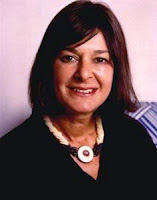BFI listing for their Euston retrospective in January 1985
 |
| Lloyd Shirley in 1975 |
 |
| George Taylor in 1983 |
From the very beginning it was intended as a small company, with the only permanent staff being an administrative unit and the creative personnel for each individual project being freelancers. Indeed, it is difficult to pick out exactly who the permanent staff were over the 21 year history - nevertheless, I will try!
In the early days of the company, before commissions became more regular, there was no headquarters as such, at least not separate from the parent company but eventually office space was rented at 365 Euston Road in London, just across the road from Thames itself. Staff remained at a minimum.
Just how much of a minimum can be seen from this photograph from the 1985 BFI publication "Made for Television: Euston Films Limited" by Manuel Alvarado and John Stewart. Just the eight employees in April 1984, around what was arguably the peak of the company's success: PAs/reception staff alongside projectionist Roy Baker and production controller Bill Launder 2nd & 4th from left in back row; plus Head of Scripts & Development Linda Agran and Executive Director of Production Johnny Goodman in front.
Euston were of course lucky to a large extent. They operated at a time when the BBC and ITV were the "comfortable duopoly" of broadcasting in Britain, neither chasing the same source of revenue. Indeed ITV's "licence to print money" allowed Euston to be formed in the first place, Thames's profits being so very high in the 1970s. It's unusual for production companies to be allowed the luxury of such control, but something of an artistic Shangri La when it does happen.
Hollywood screenwriter William Goldman talks in his "More Adventures in the Screen Trade" about working for Clint Eastwood's Malpaso Productions on the 1997 feature Absolute Power and how wonderful an experience it was dealing with just three staff - Eastwood himself included.
So as for Euston's staff over the years? Well, as mentioned Lloyd Shirley and George Taylor were the pioneers and commissioned the likes of Armchair Cinema and The Sweeney but second thoughts from the Thames management about how autonomous Euston should be led to their resignation - although their close involvement remained - in June 1976.
 |
| Verity Lambert |
With Verity Lambert in charge of commissioning, Linda Agran working with writers and Johnny Goodman keeping a close eye on budgets this exceptionally creative force worked together for 7 years and oversaw Out, Minder, The Knowledge, Fox, The Flame Trees of Thika, Reilly - Ace of Spies, The Nation's Health, Widows and many others. I mean, wow.
 |
| John Hambley, Euston's last CEO |
Hambley had been part of the Thames management and was already CEO of their animation subsidiary Cosgrove-Hall of Danger Mouse and The Wind in the Willows fame. His tenure at Euston encompassed the final phase of the company. Linda Agran departed in March 1986 for LWT and Johnny Goodman followed suit for HTV the following year.
To replace them, Hambley appointed acclaimed drama producer Andrew Brown as executive in late 1987, but whilst there were still some triumphs to come they were hamstrung by the fact that Thames's time as a franchise holder was coming to an end. An unsuccessful foray into feature film co-production in the late '80s didn't help matters but a revamped Minder remained an audience favourite and the centennial mini-series Jack the Ripper starring Michael Caine proved good fun.
In October 1991, the full implications of the Broadcasting Act of 1990 became known when Thames Television, perhaps the greatest of all the ITV companies, lost their franchise to Carlton on account of the absurd ruling that it be awarded to the highest bidder. Yes Carlton who, in the view of at least one television executive, went on to produce not one decent programme in their entire history.
With the loss of 1,400 jobs pending, Euston began to wind down, shedding what little permanent staff they had and yet, they did live to enjoy one final triumph: their 3-part adaptation, by Andrew Davies, of Angus Wilson's 1956 novel Anglo-Saxon Attitudes, featuring very early roles for future A-listers Daniel Craig and Kate Winslet, proved a huge hit and won the 1992 BAFTA for Best Drama Serial, amongst other awards.
But it was the end of the line. With the loss of the franchise on 31 December 1992, the company was bound to fold and fold it did, save for one final, reduced budget, series of Minder broadcast via Central.
But then all production companies eventually expire. The only important thing is if they made a mark while they were there. Euston certainly did, and probably directly because there were only ever a handful of people making the decisions.

This comment has been removed by a blog administrator.
ReplyDeleteThis comment has been removed by a blog administrator.
ReplyDeleteHello george.i worked with you at Thames tv
ReplyDelete